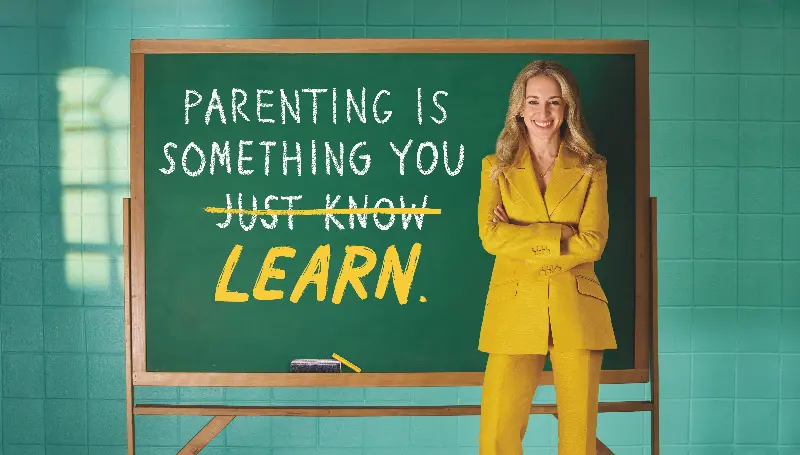
Parenting isn’t something we should expect to “just know how to do.” It’s a skill—one that requires practice, patience and the humility to get things wrong.
That’s the message clinical psychologist and Good Inside founder Dr. Becky Kennedy (@drbeckyatgoodinside) is plastering on billboards and taxis across the nation to challenge the long-held idea of “maternal instinct.”
“If you break down what instinct really is, [it’s] everything you’ve learned until that point,” Dr. Becky told Newsweek. “What really feels ‘natural’ in parenting is how we were parented.”
The mom of three, who is also best-selling author of Good Inside: A Practical Guide to Becoming the Parent You Want to be, believes that in today’s generation of parenting, there is a gap between something that feels natural, versus something that feels right and effective.
“We’re the first generation trying to parent in a world where there is a constant stream of information coming at us, often from a wide variety of people where we don’t even know their names,” Dr. Becky said. “I call this generation the ‘they generation.’”
She pointed to a particular parent who shared that she felt nervous about her child’s eating habits.
“‘They say if the table is stressful when my kid is younger, there’s a higher chance of them having an eating disorder when they’re older,’ this mom told me. This is huge fear-mongering, and the only question I said to this mom was probably different than what she expected. I just said, ‘Who’s they?’”
She emphasized that parents used to get guidance from people they actually knew and trusted. But now, they absorb advice without a name, a face or context.
That overload, she said, feeds an epidemic of parental self-doubt. Through Good Inside, which give parents the resources and support they need, Dr. Becky speaks to many parents who go to bed feeling like failures.
But perfection is never the goal. “Kids wouldn’t even benefit from having a perfect parent,” Dr. Becky said. “It would make them set up for an adulthood where they expect all the adults around them to be perfectly attuned to their needs all the time—that’s not gonna happen—and so struggling, messing up and repairing is part of the game.”
The key to raising emotionally resilient kids is the ability to repair. “I’d put my money there every time,” Dr. Becky said.
Repair is more than saying “I’m sorry.” It’s about re-establishing trust and showing children that love and connection survive conflict.
“Repair is one of the biggest trust builders in a relationship, connection builders [and] confidence builders because it establishes that there can be reconnection after a hard moment,” she explained.
It also teaches kids the lifelong skill of reconnection, with partners, friends, and eventually their own children.
She sees this as a powerful act of “cycle breaking.” Parents who apologize and repair model emotional accountability—something previous generations often viewed as a loss of authority. “Interestingly, it’s how you use your power,” Dr. Becky said.
The balance of leading and caring at the same time can be difficult to navigate as a parent. For a long time, the message was children’s feelings don’t matter and they should go to their room and fix it.
Now, Dr. Becky argues we’ve gone to another extreme: children’s feelings run the show. Both approaches, she said, are unhelpful.
“Caring about kids’ feelings helps them build confidence and resilience because you can’t learn to manage feelings you’re told you’re not supposed to have, but parents also need limits and boundaries,” she said.
For example, a parent can empathize with a child who doesn’t want to attend Aunt Sally’s 85th birthday, she explained, while still setting the boundary that the family will go together.
“So in this situation, you might be saying, ‘Oh, you don’t want to go to Aunt Sally’s 85th birthday lunch, I totally get it. You’re used to having birthday parties and soccer games on the weekends, and this is pretty different,” she said.
‘But we are going as a family. Let’s get all the whining out right now. I’ll join with you because it’s not even the number one thing on my list either, and you’re a kid who can do hard things. And I expect polite behavior when we get there.’”
Her final reminder for overwhelmed parents is simple. “This feels hard because it is hard, not because you’re doing something wrong,” she said. “You’re the right parent for your kid, and when we know better, we can do better. You deserve the same support and resources in this stage of your life that I’ve probably invested in in every other stage of life that probably mattered less. So investing in resources and getting support, all that does is bring out all the good stuff inside of us, and I really want parents to feel empowered by that, rather than ashamed.”
